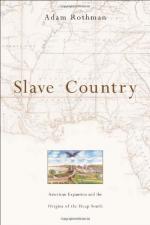|
This section contains 972 words (approx. 4 pages at 300 words per page) |

|
A Collision of Worlds.
At the time of the founding of the United States diverse peoples with varying languages, religions, and levels of technology lived across the breadth of North America. On the Eastern seaboard, the former English colonists struggled with their new republic; west of the Appalachian Mountains hundreds of indigenous groups farmed, hunted, and traded for subsistence, and in the Southwest, Spanish missionaries and ranchers occupied the northern reaches of New Spain's frontier, living in a tenuous balance with nomadic raiding tribes. Though already linked through continental trade networks by 1800, Americans often had only vague knowledge of each other and the land itself. The process of American expansion from 1800 to 1860 that extended the United States's political boundaries west to the Pacific Ocean and south to the Rio Grande brought these peoples together in a maelstrom of scientific discovery: mapping mountains and rivers, documenting newfound animal and...
|
This section contains 972 words (approx. 4 pages at 300 words per page) |

|



